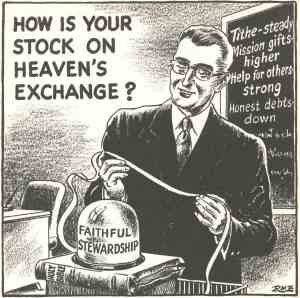
Back in the Seventies and Eighties there was a good deal of speculation in the WCG diaspora about “universal reconciliation.” My memory is hazy, but some prominence was given at the time to publications from Concordant Publishing Concern, a non-COG ministry that, apart from producing an unreadable literal translation of the New Testament, championed a conservative Protestant view of universal salvation. Someone may remember whether this was a particular interest of Ernest Martin's... it was a long time ago.
These days the diaspora has ballooned out to tens of thousands, and the interest on unitarian-universalist matters has shifted to the unitarian end with Ken Westby and others pushing a “One God” teaching. The universalist strand remains however, even if it has gathered dust for a while. Back in the pre-reformation WCG a version of universalism was popular, based on the idea of three resurrections (Wayne Cole, for example, expressed the view that the number of those who would eventually wind up in the Lake of Fire would be the merest handful.) Many members found this one of the most attractive elements in Armstrong theology. The genocidal Calvinist god, like “predestination”, is a monster concocted from well down the reptilian brain-stem. Calvin, however, was simply standing on the shoulders of one of the truly dark influences in the history of Christendom, Augustine of Hippo, author of the Confessions and the man who put the book of Revelation in the Western canon, laid the groundwork for persecution of heretics, invented the “just war” theory, and cooked up the dismal dogma of predestination in his spare time. The Protestant tradition owes much to Augustine (Luther started out as an Augustinian monk), which may explain why apocatastasis now seems a novel idea. Augustine was also a relentless self-promoter and personal myth-maker, which has long protected his reputation (the biography by James O'Donnell
So I feel a bit of an idiot to have only recently stumbled over this thing called apocatastasis, courtesy of a reference by - of all people - Bob Thiel. This is an admittedly obscure term, but it describes a view, or speculation, that is perfectly acceptable both in Roman Catholicism (despite Augustine) and the Eastern Orthodox churches. In simple terms it means universal salvation.
Some of the great luminaries of early Christianity taught that all people would ultimately be saved: notably Origen (who took the position that even Satan would ultimately be reconciled to God) and Gregory of Nyssa. That much I already knew, but assumed it had been declared heretical long ago. Not so; and I was completely ignorant of the fact that one of the most significant Catholic theologians of modern times, Hans Urs von Balthasar, also advocates a version of universalism. While apocatastasis is not a sanctioned teaching, neither is it a heresy in the Catholic and Orthodox communities.
So Herb Armstrong wasn't all that unique after all. Mike Feazell – who seems to lean toward a similar reconciliation position – isn't a heretic.
As they say, “live and learn.”







